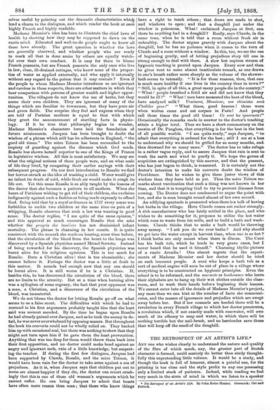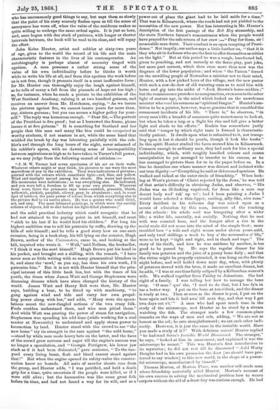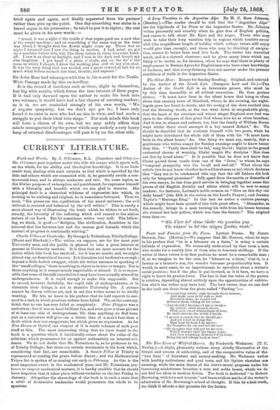THE RETROSPECT OF AN ARTIST'S LIFE.*
Ara. one who wishes clearly to understand the nature and quality of the fibre of which much, nay, the greater part of Scotch character is formed, could scarcely do better than study thought- fully this unpretending little volume. It would be a study, and though the book is full of humour, almost a painful one, for the printing is too close and the style prolix to any one possessing only a limited stock of patience. Indeed, while reading we feel very much in the state of mind in which we listen to a speaker • The Retrospect of an Artist's Life. By John Kelso Hunter. Greenock: Orr and Pollock. who has uncommonly good things to say, but says them so slowly that the point of his story scarcely flashes upon us till the sense of
annoyance has worn off, when the value of the residuum makes us quite willing to undergo the same ordeal again. It is just so here, and, once begun with due stock of patience, with longer or shorter intervals between, the book will be read to its close, and will repay the effort.
John Kelso Hunter, artist and cobbler at sixty-two years of age, gives to the world the record of his life and the main characteristic features in the lives of his contemporaries. An autobiography is perhaps almost of necessity tinged with egotism. A man possesses a rather strong sense of the value of his own individuality before he thinks it worth while to write his life at all, and from this egotism the work before as is not free, though it presents itself in a most inoffensive form ; for Mr. Hunter can thoroughly enjoy the laugh against himself, as he tells of many a fall from the pinnacle of hope set too high ; as, for instance, when he sends a picture to the exhibition of the West Scotland Academy, valuing it at two hundred guineas, and receives an answer from Mr. Hutcheson, saying, " As we insure the pictures against fire, we cannot insure yours for more than, say, sixteen guineas ; but you can secure a higher policy for your- self." The reply was humorous enough. " Dear Sir, —The portrait
of the President is fire-proof ; but as I borrowed the frame, please insure it at five guineas." It is something for Scotland and her people that this man and many like him could be recognized as
worthy students, if not masters in art, while the same hand that wielded the brush by day was labouring painfully with the cob- bler's awl through the long hours of the night, never ashamed of his cobbler's apron, with no dawning sense of incompatibility between aspirations so high as to have taken in Turner's full power, as we may judge from the following morsel of criticism :—
" J. M. W. Turner had seven specimens of his art on their walls. Whatever others might or may think, his pictures to me were the most marvellous of any in the exhibition. They were indications of pictures ; painted with the colours which constitute light—rod, blue, and yellow. 'Wind and sunlight moved among his clouds. His water had motion. His mountains were indications ; so was everything else. He indicated, and you were left a freedom to fill up your own picture. Wherever form went, there the prismatic rays went—reddish, greenish, bluish, yellowish, pinkish, purplish, silvery, grey, in abundance ; and, in some spot of interest, the pure power of colour, from which everything else in the picture fled to its native place. He was a genius who could think, act, and stop. The most laboured paintings, in which were the earthly colours of objects, fell to dirt before his light-filled phantoms ;'
and the solid practical industry which could recognize that he had not attained to the paying point in art himself, and must " stick to his last if he would feed his children." For long his highest ambition was to sell his portraits by raffle, drawing up the
bills of sale himself ; and he tells a good story how on one such occasion, being in a book shop, his bill lying on the counter, Hugh Brown, author of the Covenanters, came in, and looking at the bill, inquired who wrote it. " Well," said Neilson, the bookseller, " I think it was the cowl himself." Hugh Brown put his hand in his pocket, and brought out a shilling, with the remark, " I have
never seen so little writing with so many grammatical blunders in it, and since the sowl,' as you say, has done his own work, I'll
patronize him." But it is not with Hunter himself that the prin- cipal interest of this little book lies, but with the times of his youth, the times when James Watt and George Stephenson were dreaming dreams which have since changed the history of the world. James Watt and Henry Bell were then, Mr. Hunter says, building a boat, to be fitted up with machinery, " to gang against wind and tide and carry her own propel-
ling power along with her," and adds, " Many were the specu- lations anent the new-fangled notions o' the twa crazy folk.
Fools couldna understand them, and wise men pitied them." And while Watt was proving the power of steam for navigation, Stephenson was spending his odd time (while working for a coal master at Newcastle) to understand and apply steam power to locomotion by land. Hunter stood with the crowd to see "the new horse" try its strength in the race against "the auld horse," —stood by while men made heavy bets on the latter, and the faces of the crowd grew nervous and eager till the engine's success was no longer a speculation, and " Georgie Pettigrew, his lower jaw slack as if it had been dislocated," gave sentence, " To the tan- yard every living beast, flesh and blood cannot stand against that !" But when the engine opened its safety-valve the conster- nation knew no bounds. All sorts of murder shouts rose from the group, and Hunter adds, " I was petrified, and held a death grip for a time, quite uncertain if the people were killed, or if I were still alive ; but the locomotive was like some great folk before its time, and had not found a way for its will, and as a
power out of place the giant had to be laid aside for a time." That was in Kilmarnock, where the roads had not yet yielded to the necessities of the new power. Not less interesting is Mr. Hunter's description of the first passage of the Rob Roy steamship, and the stern Northern farmer's remonstrance when the people would have prayed for the safe return of her crew :—" Pray for them, air I no sensible man durst. Their conduct is an open tempting of Provi- dence." Not inaptly, our author says a little further on, "that it is they who sit in darkness who are the first to offer themselves as critics on the light." But at this period he was a rough, barefooted lad, given to poaching, and not unready at the fierce play, part joke, but more part earnest, which then even more than now was the disgrace of the lower population ; and when " the Patron" forced on the unwilling people of Newmilus a minister not to their mind, Hunter, with a few picked boys of the village, met the new pastor with such a row-de-dow of old watering-cans as to send him with horse and gig into the midst of "Jock Brown's horse-midden ;" but the reminiscence provokes no compunction, even seen in the sober light of mature age, in the mind which looked on the unwelcome minister who read his sermons as "spiritual fungus." Hunter's am- bition to be a painter, however, was so genuine that it ennobled the commonest incidents of his life. "There is," he observes, "in every man's life a breadth of sameness quite monotonous to look at, but when he takes a leap or a flight his rise and fall give a better light and shade to his efforts." Ruskin has somewhere justly said that " temper by which right taste is formed is characteris- tically patient. It dwells upon what is submitted to it, not tramp- ling upon it lest it should be pearls, though it look like husks." In this spirit Hunter studied the faces around him in Kilmarnock. Common enough to ordinary men, they had each for him a special individuality, which, with roughly handled colours and coarse manipulation he yet managed to transfer to his canvas, as he has managed to picture them for us in the pages before us. In a line he describes one whose manner was distant and isolated with- out true dignity:—"Everything he said or did seemed spurious. He walked and talked at the outer circle of friendship." When look- ing at Nest's picture of ' Christ rejected by the Jews,' he was told of that artist's difficulty in obtaining Judas, and observes, " His Judas was an ill-looking vagabond, far from like a man ony decent body wad' tak' up wi' ; had I been painting a Judas I would have selected a thin-lippet, smiling, silly-like, nice man." Every incident in his toilsome day was seized upon as a means of education by this man, innocent of the teaching of the schools : his whole soul was hungering after a wider life; a wider life, mentally, not socially. Nothing that he met with was counted base, and the hunger after a rise in the social scale did not come into the mind of the simple Scot ; more troubled how "a wife and eight weans under eleven years auld, and only twal' shillings a week to buy a' the necessaries o' life," were to be kept " tight and right, and in thack and rape." The story of his thrift, and how he was outdone by another, is too good to be passed by. He says the regular dinner for his family was potatoes and the juice of a penny bone daily ; and that the virtue might be properly extracted, it was hung on the fire the night before, and well boiled down next day, when, with plenty of potatoes stoved with the broo, it made an excellent dinner, but he adds, " I was at one time fairly eclipsed by a Kilbarchan weaver's wife. We walked together from Paisley to Johnstone. She had eight of a family. I was telling her how to manage the bone soup. ' 0 man !' quo' she, ' I used to do that, but I line fa'n in tae a better way. I put on the bone at ten o'clock, and the dinner is ready at twa. Then as soon as the dinner is past, I put on the bone again and lets it boil awe' till next day, and that way I get twa days out o't.'" A man who had spent much time in the study of the microscope, met Hunter as he stood by a stream watching the fish. The stranger made a few common-place remarks on the ways of men and eels, adding, " We are not as honest as the eel ; he eats straightforward ; we eat each other indi- rectly. However, it is just the same in the invisible world. Have you made a study of it?" With delicious naiveté Hunter replied " he bad read Satan's lnvisibk World Discovered. The stranger," he says, " looked at him in amazement, and explained it was the microscope he meant." This was Hunter's first introduction to its mysteries ; he did not rest till he discovered " Auld Watty Douglas had in his own possession the door [we should have pre- ferred to say window] to this new world, in the shape of a power- ful microscope, manufactured by himself."
Thomas Morton, of Morton l'lace, was another self-made man whose friendship materially aided limiter. Morton's account of his own success in solving the mechanical problem bow to weave carpets without the aid of a draw-boy was curious enough. Ile had tried again and again, and finally separated from his partner rather than give up the point. One day something was amiss in a barrel organ in his possession ; he tried to put it to rights ; the rest must be given in his own words :—
" Aweel, it was a sight o' the inside o' that organ geed me a new idea o' the carpet machine ; and on something o' the same way as the tune was lifted, I thought that the flower might come up. There was so night I dreamed that I saw the thing in motion. I had, mind ye, got up a machine before this, but, like them before it, there was some hand- aff. I saw it as clear as daylight, and I rose in the dark and keepit my e'en thegither. I got hand o' a piece o' chalk, and on the wa' o' the room in which I sleepit, I drew the working plan still wi' my e'en shut. It was the very thing that was needed, and a great reward at last for so much what before seemed lost time, trouble, and expense."
Sir John Ross had telescopes with him in his search for the North- West Passage made by this ex-herdboy.
It is the record of incidents such as these, slight in themselves, but big with results, which forms the true interest of these pages. If it had only dawned upon the author to make his book into two volumes, it would have bad a fair chance of securing readers ; as it is, we are reminded strongly of his own words, " We a' require sympathy, but we don't aye get it ; I have only found it to exist in men who had an aim in view, and had made a struggle to put their ideal into shape." For such minds this book will have a charm of its own, but we may safely affirm that minds unmagnetized by the power which may underly a very heavy heap of external disadvantages will pass it by on the other side.
































 Previous page
Previous page